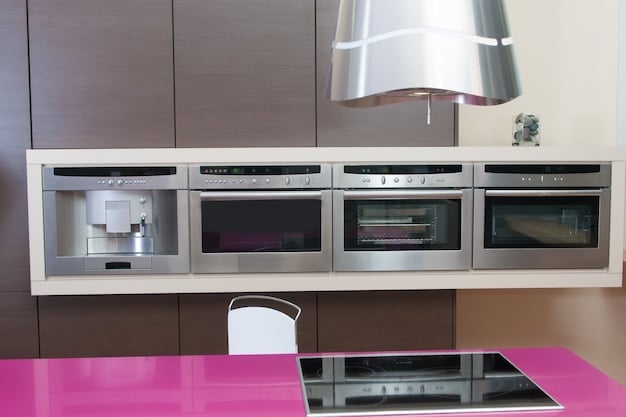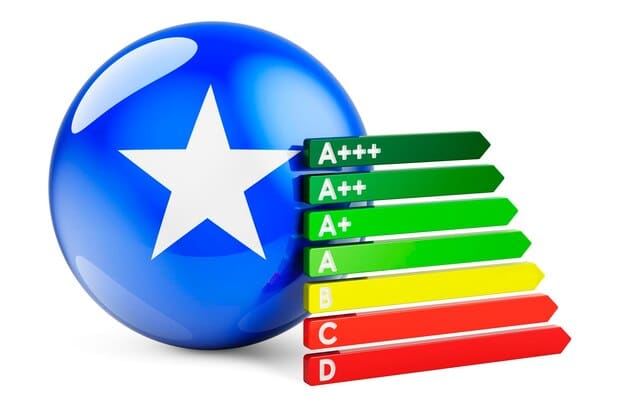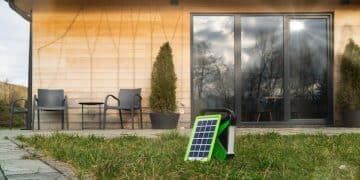Save Money and the Planet: Energy-Efficient Appliances Guide

Sustainable Living: Energy-Efficient Appliances: Save Up to $200 Per Year on Utility Bills by opting for energy-efficient appliances, which not only reduce your carbon footprint but also significantly lower your energy consumption, potentially saving you up to $200 annually on utility costs.
Embracing Sustainable Living: Energy-Efficient Appliances: Save Up to $200 Per Year on Utility Bills is a smart way to contribute to a healthier planet and a fatter wallet. Let’s explore how upgrading to more efficient appliances can shrink your utility bills and carbon footprint.
Understanding Energy-Efficient Appliances
Energy-efficient appliances are designed to consume less energy while delivering the same or better performance compared to standard models. They help reduce your energy consumption and lower your carbon footprint, offering long-term savings on your utility bills.
What Makes an Appliance Energy-Efficient?
Several factors contribute to an appliance’s energy efficiency, including advanced technology, improved insulation, and smarter design.
The Energy Star Label
Keep an eye on the Energy Star label when shopping for new appliances. This certification, provided by the Environmental Protection Agency (EPA), guarantees that the appliance meets strict energy efficiency guidelines.

- Reduced Energy Consumption: These appliances use significantly less energy than their standard counterparts.
- Lower Utility Bills: By consuming less energy, they help you save money on your monthly utility bills.
- Environmental Benefits: Energy-efficient appliances contribute to a smaller carbon footprint and a more sustainable lifestyle.
Understanding what makes an appliance energy-efficient empowers you to make informed choices when upgrading your home.
Top Energy-Efficient Appliances to Consider
Upgrading to energy-efficient appliances can make a big difference in your overall energy consumption and savings. Here are some of the top appliances to consider for your home.
Refrigerators
Modern refrigerators offer enhanced insulation and more efficient cooling systems, making them a prime candidate for energy savings. Look for Energy Star certified models to maximize these benefits.
Washing Machines
High-efficiency washing machines use less water and energy per load, helping you save on both water and electricity bills. Front-load models, in particular, are known for their superior efficiency.
Dishwashers
Energy-efficient dishwashers use less water and energy while still providing excellent cleaning performance. Models with soil sensors can adjust water usage based on the dirtiness of the dishes, further optimizing efficiency.
- Energy Star Certified Refrigerators: These models can save you up to $100 per year compared to older, less efficient refrigerators.
- High-Efficiency Washing Machines: Using a high-efficiency washing machine can save you up to 50% on water and energy costs per load.
- Smart Dishwashers: Dishwashers with smart features can optimize water and energy usage, saving you money and reducing your environmental impact.
Choosing these appliances can significantly reduce your energy consumption and contribute to a more sustainable lifestyle.
Calculating Your Potential Savings
Estimating how much you can save by switching to energy-efficient appliances involves understanding and calculating your energy usage.
Understanding Energy Consumption
Start by checking the energy consumption labels on appliances and your existing utility bills. This information can help you understand how much energy your appliances are using.
Estimating Annual Savings
Compare the energy consumption of your existing appliances with that of energy-efficient models. Use online calculators and utility company resources to estimate your potential annual savings.

- Use Online Calculators: Many websites offer energy savings calculators that can help you estimate your potential savings based on your appliance usage.
- Consult Utility Bills: Your utility bills provide valuable information about your energy usage patterns, helping you identify areas where you can save money.
- Compare Energy Labels: Compare the energy labels of your existing appliances with those of energy-efficient models to estimate your potential savings.
Calculating your potential savings can give you a clear picture of the financial benefits associated with upgrading to energy-efficient appliances.
Tips for Maximizing Energy Efficiency
Beyond upgrading to energy-efficient appliances, there are several steps you can take to further maximize your energy savings.
Proper Usage and Maintenance
Using your appliances properly and keeping them well-maintained can significantly impact their energy efficiency. Follow manufacturer guidelines and perform regular maintenance to ensure optimal performance.
Smart Settings and Features
Take advantage of the smart settings and features available on your appliances. Many modern appliances offer energy-saving modes that can help you reduce energy consumption without sacrificing performance.
Adjusting Your Habits
Simple behavioral adjustments can also contribute to energy savings. For example, washing clothes in cold water, air-drying dishes, and unplugging electronics when not in use can all make a difference.
Maximizing energy efficiency requires a combination of smart appliance choices and conscious habits.
Government Incentives and Rebates
Many governments and utility companies offer incentives and rebates to encourage homeowners to invest in energy-efficient appliances. These programs can help offset the initial cost of upgrading your appliances.
Federal Tax Credits
The federal government offers tax credits for certain energy-efficient appliances, providing a direct financial incentive for homeowners.
State and Local Rebates
Many state and local governments offer rebates for purchasing energy-efficient appliances. These rebates can vary in amount and eligibility requirements, so be sure to check with your local authorities.
Utility Company Programs
Utility companies often have programs that offer rebates and incentives for customers who purchase energy-efficient appliances. These programs are designed to help reduce overall energy demand and promote sustainability.
Taking advantage of government incentives and rebates can make upgrading to energy-efficient appliances even more affordable.
The Long-Term Benefits of Sustainable Living
Investing in energy-efficient appliances is just one aspect of sustainable living. Embracing a sustainable lifestyle offers numerous long-term benefits, both for you and the planet.
Environmental Impact
Energy-efficient appliances reduce your carbon footprint and help conserve natural resources, contributing to a healthier environment.
Financial Savings
Over time, the savings from reduced utility bills can add up significantly, making energy efficiency a smart financial investment.
- Reduced Carbon Footprint: By using less energy, you’re helping to reduce greenhouse gas emissions and combat climate change.
- Resource Conservation: Energy-efficient appliances help conserve water and other natural resources.
- Improved Air Quality: Reducing energy consumption can also improve air quality and public health.
Choosing energy-efficient appliances is an investment in a more sustainable and prosperous future.
| Key Point | Brief Description |
|---|---|
| 💡 Energy Star Label | Guarantees appliances meet strict energy efficiency standards. |
| 💧 Water Savings | High-efficiency washing machines and dishwashers use less water. |
| 💰 Cost Savings | Reduced utility bills can save up to $200 per year. |
| 🌍 Environmental Impact | Less energy consumption reduces carbon footprint. |
Frequently Asked Questions
▼
The Energy Star label is a certification provided by the EPA to indicate that an appliance meets certain energy efficiency standards, ensuring it consumes less energy than standard models.
▼
Savings vary, but upgrading to energy-efficient appliances can potentially save you up to $200 per year on utility bills, depending on the appliances and your energy usage habits.
▼
Yes, the federal government, as well as many state and local governments and utility companies, offer tax credits, rebates, and other incentives for purchasing energy-efficient appliances.
▼
Some of the most energy-efficient appliances include refrigerators, washing machines, dishwashers, and air conditioners, especially models with the Energy Star certification.
▼
To maximize energy efficiency, use your appliances properly, perform regular maintenance, take advantage of smart settings, and adjust your habits, such as washing clothes in cold water.
Conclusion
Embracing sustainable living through energy-efficient appliances is a win-win: you’ll reduce your environmental impact and save money. By understanding the benefits, choosing the right appliances, and maximizing their efficiency, you can contribute to a more sustainable future and enjoy significant long-term savings.





